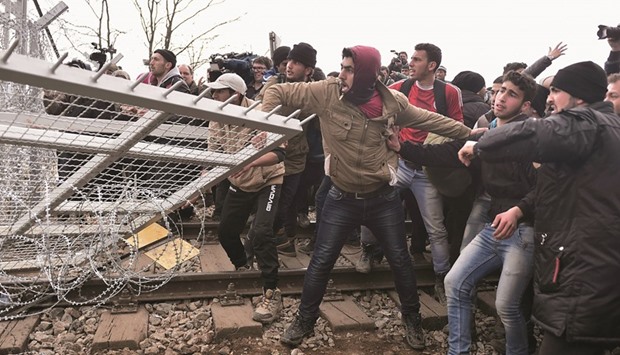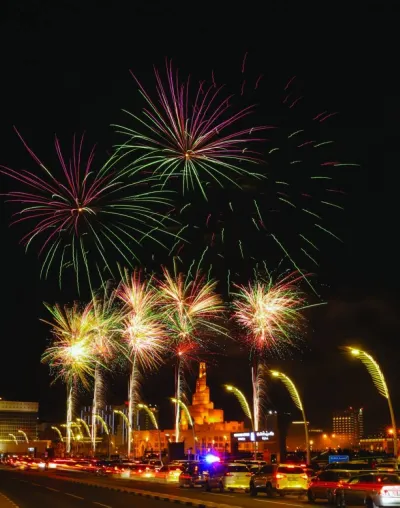Macedonian police fired tear gas to disperse hundreds of migrants who stormed the border from Greece yesterday as a deeply divided Europe traded barbs over the biggest humanitarian crisis in decades.
As frustrations boiled over at restrictions imposed on people moving through the Balkans, migrants trapped on the Greece-Macedonia border tore down a metal gate in the barbed wire fence.
A Reuters witness said Macedonian police fired several rounds of tear gas into the crowd and onto a railway line where other migrants sat refusing to move, demanding to cross into the country.
Greece raced to set up temporary accommodation for a build-up of thousands of migrants stranded in the country after Austria and countries along the Balkans migration route imposed restrictions on their borders, limiting the number of migrants able to cross.
Many of the migrants, fleeing war and poverty in the Middle East and North Africa, hope to reach Germany, which last year took in 1.1mn asylum seekers.
There were an estimated 22,000 migrants and refugees trapped in Greece yesterday, some sleeping rough in central Athens, some in an abandoned airport and at the 2004 Olympic Games venues.
Greece’s migration minister said without any outlet, that figure could rise as high as 70,000 in coming days.
More than 1mn migrants passed through Greece last year, prompting criticism from other European nations that Athens simply waved people through.
“These people do not want to stay here,” said Thodoris Dritsas, Greece’s shipping minister. “Even if we had a system in place for them to stay here permanently it wouldn’t work.”
German chancellor Angela Merkel, facing the biggest test of her decade in power, on Sunday defended her open-door policy for migrants, rejecting any limit on the number of refugees allowed into her country despite divisions within her government over the issue.
“There are many conflicting interests in Europe,” she told state broadcaster ARD. “But it is my damn duty to do everything I can so that Europe finds a collective way.”
That was lacking yesterday, a week before European Union leaders were due to meet with Turkey on how it could help quell the flow of migrants from its shores.
In an increasingly shrill debate, Austria’s defence minister suggested Merkel take in all those who were stranded in Greece.
“The German chancellor ... said that formally there is no upper limit in Germany. Then, I would invite her to take the people, who arrive in Greece now and whom she wants to take care of, directly to Germany,” Hans Peter Doskozil told Austrian’s Oe1 radio.
Thousands of people have been gathering at Idomeni, the small frontier community on Greece’s border with Macedonia, for days. Hundreds of tents were pitched in soggy fields yesterday and there were reports that fights had broken out among families over tents, which were in short supply.
Macedonian foreign minister Nicola Poposki, speaking in Geneva, said ‘encouraging’ cooperation had been established with Greece on the issue, but that it may not be enough.
“Shifting responsibility from one border to the next is clearly not the solution,” Poposki told the UN Human Rights Council.
Yesterday, a crush developed along the frontier after rumours spread that Macedonian authorities had opened the border. Crowds who gathered at the razor wire fence proceeded to use a heavy metal pole to bring down a gate. At least two people collapsed in the crush and ensuing use of tear gas, Reuters television images showed.
Aid agencies said the border was opening with Macedonia intermittently, with about 7,000 gathered in the area.
People were also being sent back for apparent discrepancies between registration documents they received from Greek authorities and their own travel documents, witnesses said.
“There are people who have been here for as long as 10 days,” said Gemma Gillie of aid agency Medicins Sans Frontieres. “Things are really stretched to the limit.”
Switzerland will draw up its own plans for limiting the flow of migrants from the European Union if it can not reach agreement with Brussels on the issue before a February 2017 deadline, the foreign minister said yesterday.
The two sides are deadlocked on how to implement a binding Swiss referendum of February 2014 in favour of immigration quotas that would violate a bilateral pact guaranteeing freedom of movement for EU citizens.
The referendum must go into effect by February next year and, with no agreement with the EU yet, Switzerland is preparing to take unilateral action.
“In all likelihood, we will go to parliament with a unilateral clause,” Foreign Minister Didier Burkhalter told reporters in Geneva after addressing the U.N. Human Rights Council.
Switzerland’s cabinet is expected to send a draft law to parliament on Friday but Burkhalter said Switzerland still wanted to find a common solution with the EU.
“We remain interested in this discussion, which could for example, let’s say, reach a conclusion during the summer.”
In December, the Swiss government asked its justice department to draft unilateral curbs on immigration by March 2016 in the event there was no breakthrough in the EU talks.
The February 2014 referendum, spearheaded by the anti-immigration Swiss People’s Party (SVP), has jeopardised a host of other Swiss-EU treaties that govern bilateral economic ties with the country’s largest trading partner and stand or fall together.
Burkhalter said it was “positive” that a date, June 23, had now been set for Britain’s referendum on whether to stay in the EU or leave, before which little progress can be expected in the talks involving Switzerland.
“They say nothing will be possible with you (the Swiss) before the British referendum,” Roberto Balzaretti, the Swiss ambassador to the European Union, told Reuters in an interview last Friday.
The EU’s priority was to take “no risk with the British debate”, Burkhalter said.
The European Commission has said it aims to find a solution on the Swiss issue this year.

Refugees pull down a fence on the Greek-Macedonian border near the village of Idomeni yesterday.


